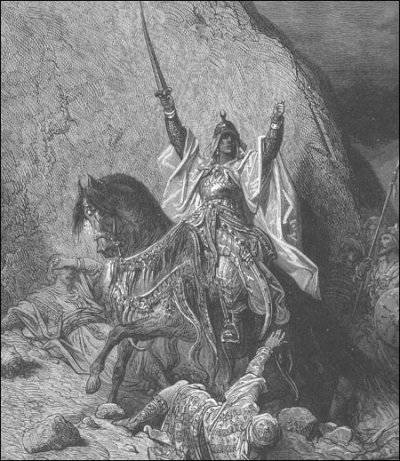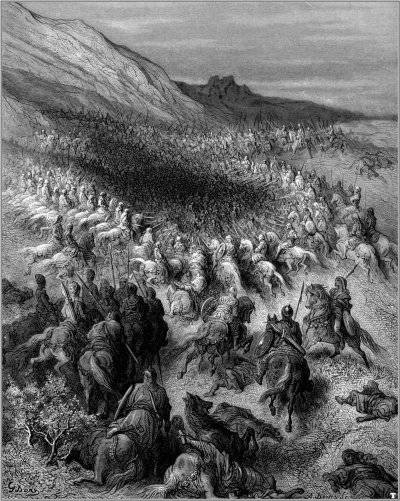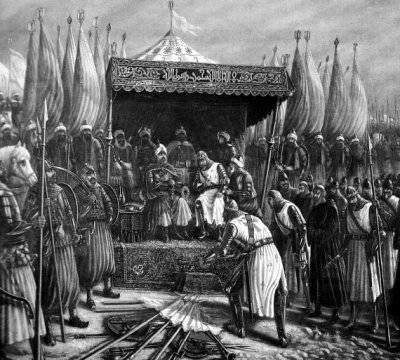Great commanders. Saladin
 Salah ad-Din Yusuf Ibn Ayyub (in a short translation from Arabic “Honor of the Faith”), (1138 - 1193), in the European tradition - Saladin - Sultan of Egypt. Historical Saladin’s personality is a symbol of political unity based on the ideals of protecting Islam from external aggression. Saladin was a Kurdish by birth, was born in the city of Tikrit, on the territory of modern Iraq. The name of this statesman and commander went down in history in connection with the Muslim confrontation of the European Crusades in the Holy Land, which became possible not least due to the strife among the then Muslim rulers of the Middle East.
Salah ad-Din Yusuf Ibn Ayyub (in a short translation from Arabic “Honor of the Faith”), (1138 - 1193), in the European tradition - Saladin - Sultan of Egypt. Historical Saladin’s personality is a symbol of political unity based on the ideals of protecting Islam from external aggression. Saladin was a Kurdish by birth, was born in the city of Tikrit, on the territory of modern Iraq. The name of this statesman and commander went down in history in connection with the Muslim confrontation of the European Crusades in the Holy Land, which became possible not least due to the strife among the then Muslim rulers of the Middle East.In his youth, Saladin was more a religious and scientific activity than a military one, but everything changed when he began to serve under the command of his uncle Assad al-Din Shirku, one of the key military commanders of the Emir Nureddin. During three military expeditions under the command of Shirka to Egypt, which aimed to prevent his final conquest by Christians, Amori I (the Latin king of Jerusalem), Shavar (the influential vizier of the Egyptian Caliph Fatimids), and Shirka flared up a fierce struggle. After Shirku’s death and the murder of Shavar Saladin in 1169, at the age of 31, he became commander of the Syrian forces in Egypt and the vizier of the Fatimid caliphate. His relatively quick rise to power is due not only to his belonging to a powerful family, but also to his own talents. Being the vizier of Egypt, he received the title of king, although in the Islamic world was called as sultan.
The position of Saladin in Egypt was strengthened after he eliminated the weak Shiite Fatimid caliphate in 1171, declaring the return of the Egyptians to the Sunni branch of Islam, becoming the sole ruler of this country. Although theoretically he remained for some time a vassal of Nureddin, finally having gained political independence after the death of the Syrian emir in 1174. Using his rich agricultural holdings in Egypt as a financial base, Saladin soon set out for Syria with a small but strictly disciplined army, claiming to regency on behalf of his former overlord's little son. However, he subsequently abandoned this idea and from 1174 to 1186 he zealously sought to unite all Muslim territories of Syria, Northern Mesopotamia, Palestine, and Egypt under his command. To achieve his goal, he used both diplomatic methods and resolutely used military force. Glory of Saladin as a generous and virtuous, but firm ruler, devoid of pretense, licentiousness and cruelty, spread throughout the East. In contrast to the bitter disagreements and intense rivalry that had previously hindered the Muslims in their struggle against the crusaders, the simplicity and clarity of Saladin’s goals contributed to their unity and spiritual rebirth.
 Each action of Saladin was caused by a deep and unshakable devotion to the idea of jihad (holy war) - the Muslim antipode of the Christian crusade. The idea of jihad was an integral part of the policy of encouraging the growth and spread of Muslim religious institutions. Saladin encouraged the activities of scholars and preachers, founded for them madrassas and mosques, entrusting them to write instructive works for young people. Through moral rebirth, which was a real part of his way of life, he tried to recreate the same zeal and enthusiasm in his state that proved so valuable to the first generations of Muslims who had conquered half of the known world five centuries earlier.
Each action of Saladin was caused by a deep and unshakable devotion to the idea of jihad (holy war) - the Muslim antipode of the Christian crusade. The idea of jihad was an integral part of the policy of encouraging the growth and spread of Muslim religious institutions. Saladin encouraged the activities of scholars and preachers, founded for them madrassas and mosques, entrusting them to write instructive works for young people. Through moral rebirth, which was a real part of his way of life, he tried to recreate the same zeal and enthusiasm in his state that proved so valuable to the first generations of Muslims who had conquered half of the known world five centuries earlier.Saladin managed to incline the military balance of forces in his favor, acting rather by internal disciplinary methods, rather than tactical ones, directed directly against the enemy. However, the tactical talent of Saladin can not be underestimated. 4 July 1187, the year Saladin lured into a trap and practically destroyed with one blow the army of the crusaders, exhausted by thirst, near Hattin in the north of Palestine. The losses of the crusaders in this battle were so great that the Muslims were able to quickly capture almost the entire kingdom of Jerusalem. Akko, Toron, Beirut, Sidon, Nazareth, Caesarea, Jaffa and Ascalon (Ashkelon) were conquered within three months. But the main achievement of Saladin is the 2 of October 1187, inflicted by him, the most catastrophic blow to the entire cross movement, namely, the capture of the holy city of Muslims and Christians by the army of Jerusalem, which was 88 years old in the hands of the Franks. Unlike the conquest of the city by Christians, when soldiers inflicted barbaric massacre on residents, and the blood of city residents flowed like a river, the Muslim conquest of Jerusalem was marked by the civilized attitude of Saladin and his troops to the defeated citizens, who were given the opportunity to leave the city freely after paying the ransom.
 The success of Saladin was overshadowed by the inability to seize Tire, which has become a real coastal fortress, which brought together Christians who have survived the recent battles. This fortress was supposed to be a unifying factor in the Latin counteroffensive. Most likely, Saladin did not expect a European reaction to his seizure of Jerusalem, but this event was a serious shock to the West, the answer to which was a new crusade. This (third) crusade was attended not only by many notable and famous knights, but also personally by the kings of the three main European countries.
The success of Saladin was overshadowed by the inability to seize Tire, which has become a real coastal fortress, which brought together Christians who have survived the recent battles. This fortress was supposed to be a unifying factor in the Latin counteroffensive. Most likely, Saladin did not expect a European reaction to his seizure of Jerusalem, but this event was a serious shock to the West, the answer to which was a new crusade. This (third) crusade was attended not only by many notable and famous knights, but also personally by the kings of the three main European countries.The crusade was long and exhausting, but despite the obvious military genius of Richard I the Lionheart, the Crusaders achieved almost nothing. For the most part, this is the achievement of Saladin. The Crusaders gradually surrendered their positions in Palestine, and when King Richard left the Middle East in October 1192, the confrontation was over. Saladin retired to his capital in Damascus, where he died of 4 disease March 1193. Saladin was buried in Damascus, and his death was a tragedy for the whole of the East ...
While Saladin’s relatives argued fiercely, preparing to tear the empire apart, his friends discovered that the most powerful and most generous ruler in the Muslim world did not leave enough money to pay for his grave. The descendants of Saladin continued to rule in Egypt and in the neighboring lands of the Ayyubid dynasty until the arrival of the Egyptian Mamluks in 1250.
Information